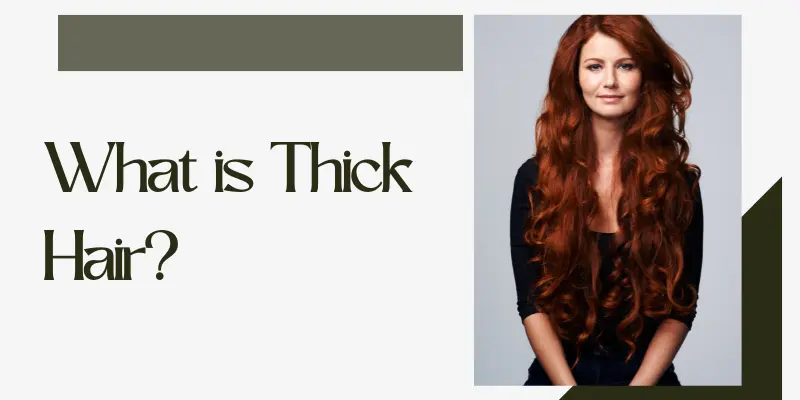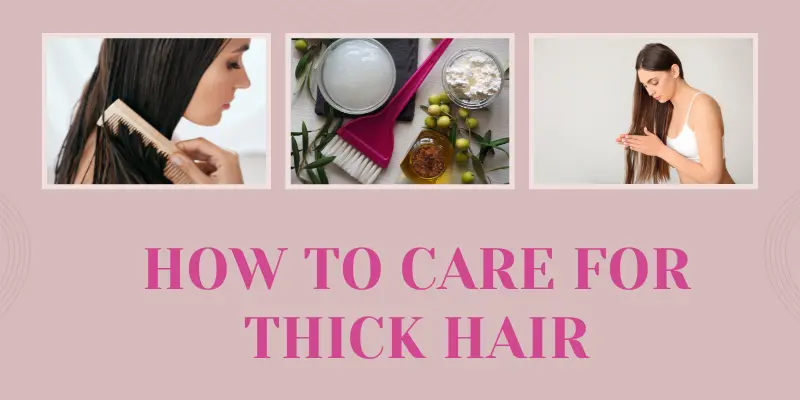Thick Hair Care Tips: How to Keep Your Hair Healthy and Easy to Manage
Published: 12 Mar 2025
Did you know that thick hair has more hair follicles per square inch than other hair types? While this gives it a gorgeous, voluminous look, it also makes it harder to manage. From dryness to frizz, thick hair comes with its own set of challenges. But don’t worry, with the right thick hair care tips, you can keep your locks healthy, shiny, and easy to style. Let’s explore how!
What is Thick Hair?
Thick hair is all about density and strand thickness. It means you have more hair follicles per square inch, and each strand is wider than average key aspects when understanding hair density and growth facts.

Thick hair can be straight, wavy, curly, or coily. No matter the texture, thick hair is full of volume and potential.
Common Thick Hair Problems
Thick hair can feel heavy and hard to style. It often gets dry because it needs more moisture to stay healthy. Frizz is another common issue, especially in humid weather. But don’t worry, these problems can be managed with the right care.
How to Care for Thick Hair
Caring for thick hair starts with using a moisturizing shampoo and conditioner to keep it hydrated and manageable.
Detangle gently using a wide-tooth comb to avoid breakage and reduce frizz.
Regular deep conditioning treatments help maintain softness and control.

Avoid heavy products that can weigh thick hair down—instead, opt for lightweight oils or serums.
Trimming every few months keeps thick hair healthy and prevents split ends.
1. How to Wash Thick Hair
Use a clarifying shampoo to remove buildup without drying your hair. Wash your hair 2-3 times a week to keep it clean but not too dry. Focus on cleansing your scalp thoroughly to prevent oil buildup.
2. Conditioning Thick Hair
Thick hair needs lots of moisture. Use a rich conditioner every time you wash. Focus on the mid-lengths and ends, where hair tends to be driest. For extra hydration, try a deep conditioning treatment once a week.
3. Detangling Thick Hair
Thick hair tangles easily. Use a wide-tooth comb to detangle gently. Always detangle when your hair is wet and coated with conditioner. Start from the end and work your way up to avoid breakage.
4. Styling Thick Hair
Use lightweight products to avoid weighing your hair down. A layered haircut can reduce bulk and make thick hair more manageable. When blow-drying, opt for one of the Best Hair Brushes, like a paddle brush, to achieve smooth, voluminous styles.
5. Drying Thick Hair
Let your hair air dry for a natural, relaxed look. If you’re in a hurry, use a diffuser to enhance curls or waves without frizz. Avoid rough towels; use a microfiber towel or a cotton T-shirt to dry your hair gently.
6. Nighttime Care for Thick Hair
Sleep on a silk pillowcase to reduce friction and prevent frizz. One of the key benefits of silk pillowcases is their ability to keep hair smooth and reduce breakage. Try a loose braid or bun to keep your hair tangle-free overnight. These small changes can make a big difference!
7. Refreshing Thick Hair
Mix water and a little leave-in conditioner in a spray bottle to make a refreshing spray. Spritz it on your hair to revive your style. Dry shampoo can also absorb excess oil and add volume to the roots.
Common Mistakes to Avoid
Over-washing: Strips natural oils and dries out thick hair.

- Using heavy products: They weigh down thick hair and make it look flat.
- Skipping trims: Regular trims prevent split ends and keep hair healthy.
Conclusion
Thick hair is a blessing, but it needs the right care to look its best. By following these tips, like using the right products, avoiding common mistakes, and embracing protective styles, you can keep your thick hair healthy and stunning. Try these tips today and share your results with us
FAQs About Thick Hair
Not necessarily! Thick hair refers to the density and width of each strand, while curly hair refers to the shape of the strands. You can have thick hair that’s straight, wavy, or curly.
Yes! Thick hair can be fine (thin strands) or coarse (thick strands). The key difference is the number of hair follicles, which makes it dense.
2A waves are loose and subtle, while 2C waves are more defined and closer to curls. Both can be thick, but 2C tends to have more volume and texture.
Not always! Thick hair can look flat if it’s weighed down by heavy products or lacks proper care. The right routine can bring out its natural volume.
Yes! This is called a “combination scalp.” Your scalp might produce excess oil, while the ends of your thick hair stay dry. Balancing your routine is key.
It can be! Thick hair often requires more time and product to style, but it also holds styles better once done. Lightweight products and layers can help.
Yes, due to factors like aging, stress, or improper care. However, thick hair can maintain its density with a healthy diet and proper hair care.
Absolutely! Thick hair can be straight, wavy, curly, or coily. Each texture has its own care needs, but all benefit from hydration and gentle handling.
Not necessarily. Hair growth depends on genetics and health, not thickness. However, thick hair might appear to grow faster because it’s more noticeable.
You can’t change your natural hair type, but you can alter its appearance with treatments, styling, or haircuts. For example, layers can make thick hair look lighter.

- Be Respectful
- Stay Relevant
- Stay Positive
- True Feedback
- Encourage Discussion
- Avoid Spamming
- No Fake News
- Don't Copy-Paste
- No Personal Attacks

- Be Respectful
- Stay Relevant
- Stay Positive
- True Feedback
- Encourage Discussion
- Avoid Spamming
- No Fake News
- Don't Copy-Paste
- No Personal Attacks





